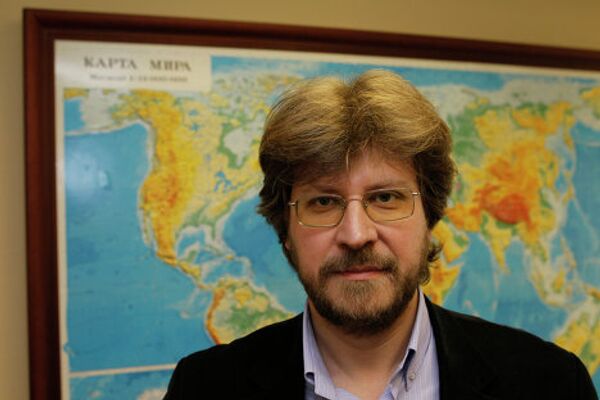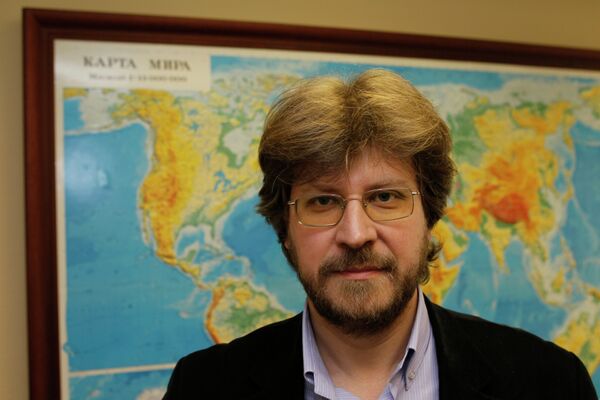One can only marvel at how quickly things change. Just a short while ago, Russia seemed to be retreating on all diplomatic fronts.
An attack on Syria was just around the corner, with Iran likely to fall victim next. Ukraine was rushing full tilt towards association with the European Union. All Russia’s efforts were failing.
Three months later, President Bashar Assad rides confidently in post, there has been an unexpected diplomatic breakthrough in relations with Iran, while the EU summit in Vilnius, which was conceived as a triumph for a United Europe, whose powerful appeal could not be resisted by the two prospective associated members – Armenia and Ukraine – ended in a flop.

What has changed? Nothing.
The circumstances are the same, as is the overall alignment of forces. All the main characters behave as they did before.
Why then does Moscow, the putative former number one loser, unexpectedly look like the most skilful player in the tactical, if not strategic, field?
It turns out that the linchpin of success in a world in which nothing is clear, no rules are in effect and where former mainstays are being eroded is adherence to a consistent principle – maybe any principle, as long as the stance is firm enough.
Principles are not values, EU style, nor Soviet-style ideology. Behavioral principles are a system of views on what the world is all about, and how you should act to conform to norms that may not necessarily exist in word.
The accepted view on Russia in general, and on President Vladimir Putin’s Russia in particular, is of a country pursuing an archaic foreign policy and reliant on an old-fashioned, arcane armamentarium.
Its representations hinge on the inviolability of national sovereignty, which prevails over all new tidings as regards “responsibility to protect,” which implies the right of outside forces to interfere in the internal affairs of a state.
This stance exemplifies a legalistic approach, which means that all global players must respect international law, provided the prime principle, sovereignty, does not require that you deviate from the former for the sake of its assertion. (This is why Russia, which normally reveres the UN and its institutions, is so offhand about the ruling of the UN International Tribunal for the Law of the Sea with regard to the Greenpeace ship.)
Russia believes that in the final analysis – no matter what people say about various new types of power, good old “hard power” will always prevail.
Moreover, there is even no need to use it. As a rule, it’s enough just to show resolve.
Finally, relations between countries amount to an unending fight for power and prestige, as a classical author of the political realism school, Hans Morgenthau, used to say. It is thus inadmissible to let yourself be deluded by incantations to the effect that in the modern world there is no winning in a “zero-sum game.”
Inherent in the Russian tradition, these views have attained their purest and most consummate form under Putin, particularly after his recent return to the Kremlin.
He is convinced that only a firm mainstay – a real one, if it is available, or an intellectual construct, if everything is falling apart in reality – will help a nation survive amid growing chaos. And the classical approaches to international relations are supposed to perform precisely this function.
Current results show that this approach works, because it is the abiding by a certain methodology that sets Russia apart from other major players.
The European Union talks about values and applies this yardstick to different situations from the Middle East and North Africa to East Europe and South Caucasus.
Without analyzing the causes, one can only state that it has failed everywhere. Europe is nowhere to be seen as an influential actor in the Middle East, nor is it getting on with the CIS countries, where, seemingly, it should be able to enjoy every advantage.
The United States prefers an ideologically consistent approach, dividing participants in conflicts into “progressives” and “retrogrades.”
But the Mideast reality can drive everyone to despair. As developments forge ahead, they are less and less amenable to fitting into this simple framework. Hence the thrashing about in search of the “right side of the story.”
Russia’s policies have resulted in Moscow’s growing prestige, but in itself this fact can become a trap because it generates growing expectations. Incoherent US behavior in the Middle East and its attempts to play down its presence and activity are leading to a vacuum, with everyone habitually looking at Russia as someone best fit to fill it.
And who else can do it, if you think about it? The memory of the system role played by the Soviet Union there is still alive and there are no other candidates in sight. China is shying away from liabilities as if they could burn its fingers.
Paradoxically, Russia has no intention whatsoever to come back to this part of the world as the main outside force. Neither was this the aim of the Syrian policy, which, properly speaking, was not directly aimed at the Middle East itself. The important thing for Russia was to make everyone realize the above principle: interference with the aim of regime change is inadmissible because it is a path to all-out ruin.
The comeback materialized largely because others made blunders, but now Moscow is not quite sure how it should capitalize on this achievement. Of course, Moscow is not averse to signing more arms contracts, but something else – and on a grander scale – is expected. Russia, however, is not ready to get embroiled in the largely hopeless affairs of the region.
Ukraine, it would seem, is another matter.
Russia’s vested interest is obvious. But the spirit of rivalry will fizzle out, leaving questions as to what to do with a neighboring and so close a country.
After all, Kiev didn’t make a choice in favor of Moscow. It has simply bowed out of choosing once again in the hope that it will be in a position to extort benefits from both parties. Riding the crest of a wave of success, Russia might launch a stick-and-carrot offensive in order to inveigle Kiev into its institutional embrace, but there is a high risk that all inputs will go down the drain without any visible effect and that relations with Ukraine will get stuck in a rut. When all is said and done, the drift towards the West continues regardless of the volatile priorities of the powers that be.
It’s an odd situation.
The Russian leadership feels the world’s instability better than others and uses this knowledge to its advantage. But the more success is achieved, the less is it clear what is to be done about it.
Russia doesn’t know what it would like to be in the future, what role to play, and what priorities to set. And this is the most important thing. It has developed a view of the world that help it get tactics right, but it lacks an equally systemic view of itself, which should determine its strategy. But tactics alone are a short-term asset.
The views expressed in this article are the author’s and may not necessarily represent those of RIA Novosti.
Is Russia unpredictable? Perhaps, but one shouldn’t exaggerate – its randomness often follows a consistent pattern. But is the world at large predictable? The past two decades have seen all forecasts refuted more than once and have taught us only one thing – to be ready for any change. This column is on what the nations and governments are facing in the era of global uncertainty.
*Fyodor Lukyanov is Editor-in-Chief of the Russia in Global Affairs journal – the most authoritative source of expertise on Russian foreign policy and global developments. He is also a frequent commentator on international affairs and contributes to various media in the United States, Europe and China, including academic journals Social Research, Europe-Asia Studies, Columbia Journal of International Affairs. Mr. Lukyanov is a senior member of the Council on Foreign and Defense Policy and a member of the Presidential Council on Human Rights and Civic Society Institutions. He holds a degree from Moscow State University.
Uncertain World: Russia: Shifting the Focus from Europe to Asia
Uncertain World: Ukraine’s Final Declaration of Independence
Uncertain World: Russia and the Ghost of Solitude
Uncertain World: The US Internal Crisis and its Global Significance
Uncertain World: Grand Diplomacy Is Back
Uncertain World: Why Hasn’t Obama Renewed US Foreign Policy?
Uncertain World: Russia and Ukraine on the Verge of a Decisive Choice
Uncertain World: 5 Years After the 5-Day War, Everyone’s Learned Their Lessons
Uncertain World: Central Asia: An Indicator of Russia’s Imperial Aspirations
Uncertain World: Confusion and Irritation Reign in Global Politics

